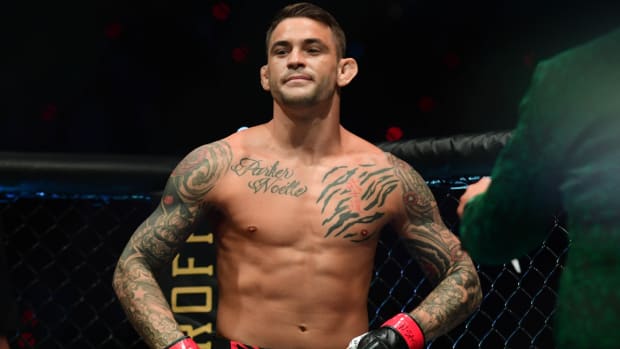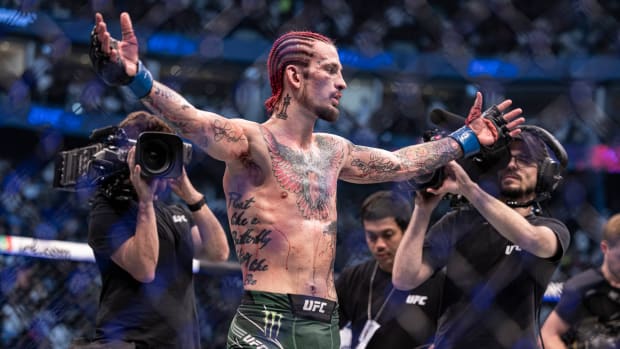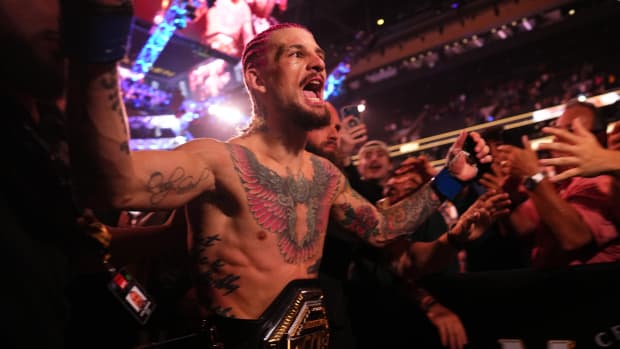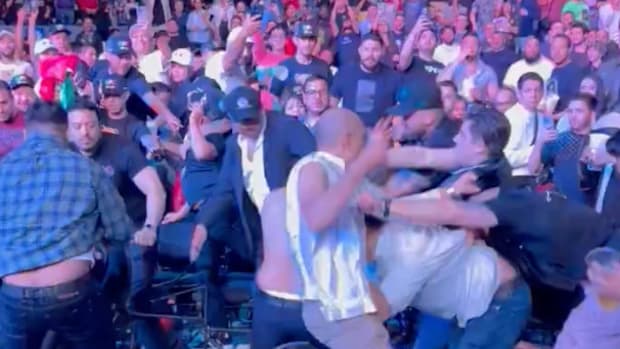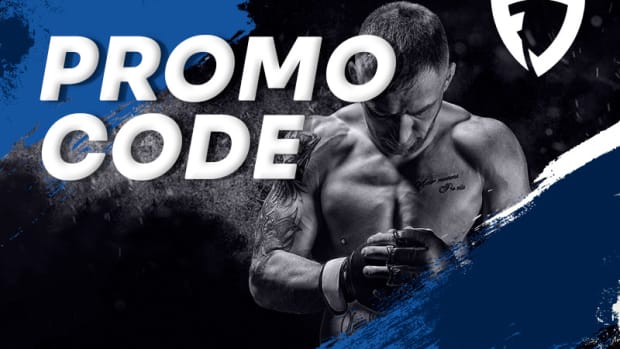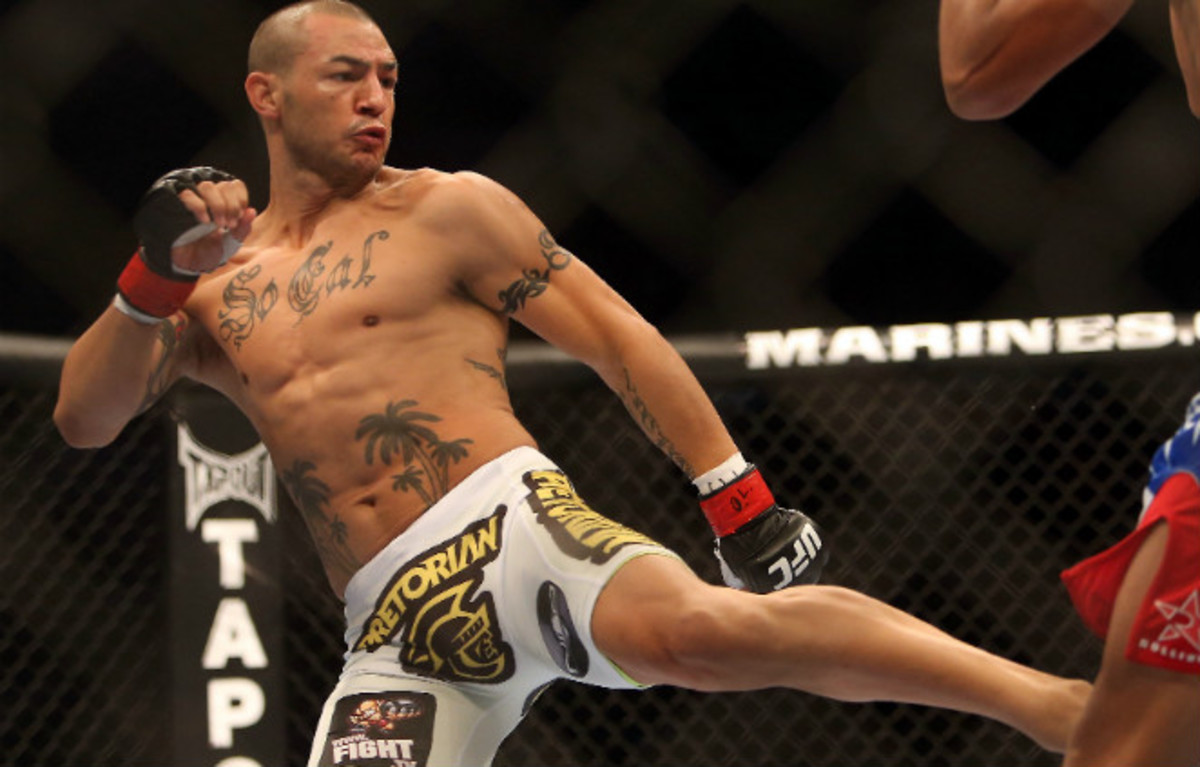
Cub Swanson conquers self-doubt in climb up MMA ranks
No, the administrators at California's Indio Juvenile Hall told him time and again, they would not allow him into the detention center to speak with the kids in lockup.
But the jail directors who kept denying Swanson's requests didn't realize that the same stubbornness that landed him in Indio as a teen would be the same stubbornness he'd use to get back in as an adult. Swanson's repeated requests and calls functioned much the way a series of jabs to the torso would -- eventually wearing down his adversaries, who, in time, allowed him to attach himself to a visiting church group. When he finally made this way back into the facility he once couldn't wait to leave, he played pick up basketball with the kids who are so much like he used to be. But before he left, he stood in front of the boys gathered before him, certain to impart the same message he'd share in each of his return visits throughout the year.
"You guys are all stubborn I'm sure and you're all very motivated at something," he told his captive audience. "Don't let people tell you that's a bad thing but let it be towards something good. My stubbornness of wanting this fighting career has saved me."
If fighting served as Swanson's salvation, then this Saturday's bout against the lanky Dustin Poirier (13-2-0) might very well spur his professional resurrection. Swanson (18-5-0) has been repeatedly slapped with the most backhanded compliment in all of sports: He's got great potential.
The 29-year-old Palm Springs, Calif., native quickly captured the imagination of the mixed martial arts community when he strung together 11 consecutive victories in his first 12 professional fights. But a series of disappointing showings against big-name opponents and devastating injuries threatened to bump Swanson from the ranks of rising star to that of underachieving talent. He beat John Franchi in Nov. 2009 with two broken hands and had to delay his UFC debut after a training partner's flying knee crushed Swanson's nasal, orbital, check and jawbones. Swanson needed three metal plates and two surgeons to address the injury. He says he's now healthy and healed, including his deepest wound of all, the one that's trapped him more tightly than any of Indio's wall ever could: His self-doubt.
*****
The salvation of Cub Swanson began 13 years ago, when the door to his cell at Indio opened but a few times daily to deliver his meals. He'd ended up in juvenile hall after an outing with friends resulted in a breaking-and-entering charge. "I was with two friends and it was actually my other friend and then he ended up blaming the whole thing on me so I got into more trouble," Swanson says. The real culprit in the crime, he says, had a baby face and a pay lawyer, meaning Swanson took the hardest hit in the case.
Like most of the kids jailed with him, Swanson came from a fractured home. Just three months after his birth, he'd lose his father to cancer and, not long after, his mother to grief. The death of Swanson's father left his mother alone, trying to raise four kids and cope with her loss. Overwhelmed by the pressure, his mother made the decision she thought was best for kids: She gave them up. A distant family member adopted Swanson in an arrangement that enabled his mother to continue to see her children as she healed. But when his adoptive parents divorced when Swanson was 14, he moved back with his mother and found more than just a maternal connection. He found friends in gangs, street brawls, and the kind of trouble that landed him in Indio. But it was there, locked up and lonely, that Swanson came to the conclusion that would alter his course forever: He was better than that.
*****
Two years removed from his release, 19-year-old Swanson found himself pulling double duty. By day, he worked for United Cerebral Palsy, chasing developmentally challenged children around parks, accompanying them down the playground slides, and even changing their diapers. "I got bit, spit on, scratched, anything you could think of," he says, "but the one thing I could say is the majority of the kids were happy all the time and that kinda was inspiring." Biting, spitting, scratching during the day transitioned into kicking, punching, and grappling after sundown at Joe Moreira's jujitsu studio in Palm Springs.
"I wanted to do some sort of martial arts to stay out of trouble," Swanson says. "I was thinking taekwondo or something."
Swanson found the something, instead. He'd wandered into Moreira's studio quite by accident, never having heard of jujitsu or the UFC. It only took one class to convince him he needed to know more. "I knew it was legit because there were some kids in there who were just kinda nerds and they kicked the crap out of me," he says. "I was like this is not possible. I don't know what they're doing to me. I just started going back every day and I just wanted to master it. I told the instructor, like everyone else does, 'I'm going to be back every day. You watch, I'm going to be your best student.''"
In the studio, Swanson found both an outlet for his emotions and structure in his life he so badly needed. Soon, he found himself traveling to tournaments, going anywhere and everywhere he could possibly compete. One evening, friends from the dojo suggested they head to a nearby King of the Cage event. After spending the night cageside, Swanson was hooked. "It scared the hell out of me but I thought that I could conquer it," he says.
But first he'd have to conquer his schedule. The emotional toll of his day job combined with physical demands of his training left Swanson exhausted by the time he made it home to read the book on his nightstand, Inside U: How to Become Master of Your Own Destiny. The book chronicled the rise of World Martial Arts Hall of Famer, Byong Yu, and his remarkable journey from Korea to the United States, as well as his triumphs over physical disabilities, homelessness and cultural dislocation.
"He took the leap of faith and just went," Swanson remembers. "And that kinda motivated me to say, screw it, and just go after it."
Swanson quit his day job, enlisted an agent, and shot off an email to established MMA fighter, Joe Stevenson, whom Swanson admired. A month later, Swanson picked up the phone to hear Stevenson on the other end, saying, "Hey, buddy, what's up?" and offering his fan an invitation to train with him. By July 2004, Swanson made his professional debut in a Tijuana, Mexico nightclub. "I ended up losing in like, 30 seconds," he laughs. "I hurt my knee right off the bat."
Both his mothers -- adopted and birth -- hoped this would end what most people in his life considered a crazy experiment. "Everybody was like, 'Ok, you going to give it up now? This is stupid,'" he says. "That made me want to go after it even more."
Four months later, Swanson was back at the same Mexican nightclub. He launched a flurry of punches to end his second pro fight in the first round. It would be the first of 11 straight wins and a steady climb up the MMA ranks. He won with what he describes as an approach to "be the toughest dude I could possibly be. Just to always come forward and don't let anyone break you."
But Swanson quickly discovered that doesn't philosophy always work. "It can get you pretty far but if you get someone who outsmarts you or is just a little bit tougher than you, you're not going to win all the time," he says.
It's a lesson he learned the hard way when, in Dec. 2007, Jens Pulver caught him with a guillotine just 35 seconds into the first round of their World Extreme Cagefighting clash. He learned the lesson again in 2009 when current flyweight champion Jose Aldo caught him with a flying knee eight seconds after the fight began. And again a year after the Aldo fight, when Chad Mendes won a unanimous decision. Suddenly, it seemed that the fighter who never lost couldn't find a way to win -- at least not consistently. Not even his three wins sprinkled between those losses -- including the remarkable, broken-handed win over Franchi -- helped ease his gnawing self-doubt. The downtime he needed to heal from his string of injuries just gave that doubt the time and space it needed to grow.
"After I lost to Chad Mendes, that was a point in my life when everything had changed, I really didn't know why I was fighting anymore, for a brief amount of time," Swanson says.
But the little voice inside him that told him in juvie, "I'm better than that" was the same voice that told him he should be sick of what he describes as "just being depressed after losses and being happy at the good times and just even not being able to be happy when I should be. That's kinda led me to diving deep into myself."
It also led him 700 miles east, to Albuquerque, NM., and renowned trainer Greg Jackson. While Swanson continued to work out with boxing coach Joel Diaz in Palm Springs, Jackson helped the fighter correct his most fatal flaw in the cage: His mind.
"For a long time, I've been an overthinker," he says. "The problem with that is when you're in perfect shape for a fight and you've got everything worked out and you've got all the moves you think you're going to need and everything's fine but in your own mind you're going to make up things and you just add pressure. You end up not performing well because you're adding stuff, problems that you don't need. There's nothing there to worry about. So [Greg] came in and showed me how to relax and have fun with it and just let the training take over and go out there and don't put so much pressure on yourself to be perfect."
Jackson's lesson cemented in Swanson's mind during an evening workout several fights ago. Swanson kept badgering the trainer with questions that all started with, "what if." Jackson, worn down after a long day, sighed. "Cub, if I asked you to walk through that door right there, would you ask me what foot you should start with, how many steps and how big of steps? Or would you just get up and walk through the damn door?"
The nervous fighter dropped his metaphorical guard and couldn't help but laugh and say, "OK, I get the point."
Bolstered by this confidence, Swanson has reeled off three straight wins since January 2012, each ended by his explosive striking game, against George Roop, Ross Pearson, and Charles Oliveira. He's arguably the most resurgent fighter in one of the deepest weight classes in the UFC. A win over Poirier could put him one more fight -- maybe two -- from a title shot. But that's not Swanson's focus right now.
"I take it one fight at a time," he says. "I know that I'm very close but for me it's never been about winning titles. For me, it's always been about being the absolutely best you could possibly be. I feel like I'm getting closer and closer to that and that's my real goal. If me being the best Cub I can be means I get a belt and I've become the best, that will make me even more happy, but I just want to be able to retire someday and be happy that I reached my full potential."
Swanson isn't just trying to fulfill his own talents, but actively helps others in reach theirs, too. He teaches amateur fighters at his gym, TruMMA in Palm Springs, offering a level of coaching not readily available in his old neighborhood. But there's no doubt who his favorite student is: older brother, Steve, whom Swanson has cornered as big brother has won each of his 10 pro fights. And then there are the boys back at Indio, who now await Swanson's regular visits, and doses of advice and attention.
"I felt morally obligated to go back and do that and really give back and try to help anybody and just show those kids -- that almost all of them are good kids -- they just come from broken homes or they're on their own path and don't have any direction or they're just bored."
Or like Swanson, just need a little time to realize just how much they have to give.
